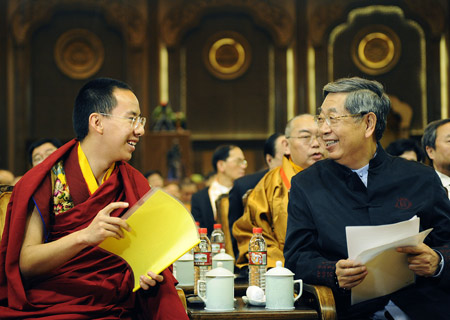The 11th Panchen Lama, Bainqen Erdini Qoigyijabu, said in Wuxi Saturday that China enjoys religious freedom.
Addressing the opening ceremony of the Second World Buddhist Forum in English, the living buddha said that this event fully demonstrates that China nowadays enjoys social harmony, stability and religious freedom. It also shows China is a nation that safeguards and promotes world peace.
|

|
|
The 11th Panchen Lama, Bainqen Erdini Qoigyijabu, talks with Xu Jialu, former vice-chairman of the Standing Committee of the National People's Congress of China, before the opening ceremony of the Second World Buddhist Forum (WBF) in Wuxi, east China's Jiangsu Province on March 28, 2009. |
He called on people in the modern world to do more beneficial deeds and serve others.
Extending his gratitude to the central government for the concern for and patronage to the forum, the Panchen Lama said, "This forum is convened in my country -- China, which has a Buddhist cultural tradition going back 2,000 years."
More than 1,700 Buddhist monks and scholars from about 50 countries and regions attended the forum. The event, with the theme "A harmonious world, a synergy of condition," was jointly organized by the Buddhist Association of China, the Buddha's Light International Association, the Hong Kong Buddhist Association, and the China Religious Culture Communication Association.
The Panchen Lama said that the rapid development of "external material science and technology," or material civilization of the present world, brings about convenient facilities for people's lives.
"But on the other hand, it also causes the environment degradation, growing disparity between the rich and the poor, financial crises, armed conflicts and wars, terrorist attacks and the like," the 19-year-old monk said.
The Dalai Lama and the Panchen Lama are the most important religious figures in Tibet.
"The reason for all the adversity lies in people's mind -- many people are deluded regarding the causes of suffering and happiness, feel discontent, lack of compassion," he said.
"Sutras tell us: Good is rewarded with good, evil with evil. We should now guide and encourage people with the law of causality to serve others with beneficial deeds," he said.
"Only if we carry forward the philanthropic moral spirit, will everyone be guided to do good, and not to harm others; can everyone bear love and mercy, benefit all sentient beings and protect the environment, so as to enable people to enjoy a harmonious and happy life," he added.
Calling for achieving harmony among different Buddhism sects, he said, "different sects within Buddhism should respect each other and coexist in harmony," he said. "In order that Buddha Dharma can live on and flourish, we should foster more outstanding talents."
Panchen Lama's English speech received applauses and appreciation from the participants in the forum.
"The 11th Panchen Lama's wonderful English speech has joyfully shocked the Buddhist masters and cultural elites present at the forum," said Master Xue Cheng, vice president and secretary-general of the Buddhist Association of China (BAC). "He has a good command of the Chinese, English and Tibetan languages."
"The Buddhists from English-speaking countries who I talked with shortly after his speech have highly praised his English proficiency," said Xue.
"His good command of English shows his endeavors and the care from the Chinese government," he added.
"Since English is an international language, the 11th Panchen Lama's speech in English this time will definitely impress the world," said Shi Yongxin,abbot of China's famed Shaolin Temple.
"He appeared very mature and moderate," Shi added.
"As far as I know, the 11th Panchen Lama learns the Tibetan language and Buddhism knowledge in a very assiduous way," said Jalsan, BAC Standing Member of Council of Directors.
"Three years ago, he delivered his speech at the First World Buddhist Forum in Tibetan while now his English is very fluent," added Jalsan, also president of the Buddhist Association of Inner Mongolia. "It shows that he had made great progress."
"I myself is a follower of the Tibetan Buddhism and we disciples of the Tibetan Buddhism pin great hopes on him," he said.
"His English speech is very commendable," said Professor H. Abeygunawardena, Vice Chancellor of University of Peradeniya in Sri Lanka. "His learning English embodies China's policy of religious freedom."
"Since I do not speak Chinese and Tibetan, I'd prefer that he continues to deliver speech in English," he said. "So what get lost in translation will be minimized."
The five-day forum will be held in two parts. The first part will be held from March 28 to 29 in Wuxi, Jiangsu Province. The participants will move from Nanjing to Taipei by four direct charter flights on March 30, where the second part of the forum will be held from March 31 to April 1.
(Xinhua News Agency March 28, 2009)